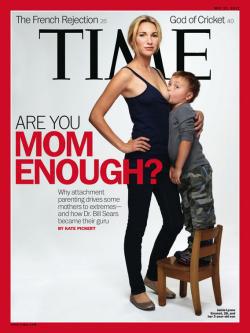When Jamie Lynne Grumet pulled down her tank top and stood her son, at the time almost 4 years old, on a chair so he could pose nursing for a Time cover story on attachment parenting in May, my main reaction was sympathy for her son. It’s embarrassing enough for us to come face-to-face with our younger selves on our parents’ refrigerators. I couldn’t imagine having my baby bath pictures, much less a snapshot of me doing something a lot of people find controversial, available in my Google search results before I hit elementary school, for any well-meaning school teacher, nosy classmate, first date, or potential employer to see for years to come.
Turns out Grumet’s son got off easy. Jeff Collins, president of the production company responsible for Dance Moms, among other reality shows, is working on a reality program about extended breast-feeding and other “extreme parenting” techniques. “We’ve discovered people are raising kids in all kinds of untraditional ways these days,” Collins told Yahoo, “and some people find their methods to be extreme.”
I’m sure Collins is right to bet that this topic will draw viewers, even among those who might consider themselves too highbrow for Toddlers and Tiaras, or its spinoff Here Comes Honey Boo Boo, which features a particularly deluded mother and daughter. There seems to be an endless market for columns, books, trashy reality programming, and magazine covers that provide opportunities for people to judge each other’s parenting decisions, be it Tiger Mothering, toddler breast-feeding, or doping your daughter with the stimulant “go-go juice” to psych her up for beauty pagents. And that demand is, sadly, matched by an endless supply of parents willing to expose themselves and their children in the hopes that their genius will be recognized, or in the savvier calculation that toughing out ridicule may be worth the financial payout. That shows like these appear on TLC, once the Learning Channel, gives some of them them the cover of “documentary filmmaking,” but the truth is that they are human disaster porn, whether chronicling traumatic births or pageant meltdowns.
Also: Just because a show about unusual parenting tactics might be successful doesn’t mean it’s a good idea. The parents involved in Collins’ latest effort may be able to ride it to talk show appearances and parenting book deals. But their kids will be nationally televised lab rats in these parenting experiments, judged for how they turn out as a result of treatment that diverges from the norm (and probably more so for the cameras), before they even have a shot at crafting their own identities and breaking free from their parents’ influence. The kids will be paraded out in front of a huge audience, indelible images of them created week to week, long before they can give any meaningful consent. And, if the show succeeds, many, many people will profit.
NPR’s Linda Holmes, in a post written after the suicide of a Real Housewife of Beverly Hills husband, laid out a proposed code of ethics for reality television, including the suggestion that “shows agree to use no nonincidental footage of any child under age 10, and to employ an on-set counselor specializing in adolescents to provide care and advice on the well-being of any participant who is a minor.” It would be nice if that sensible suggestion resonated with enough networks to make a difference. But adopting it would kill an entire genre of reality programming, where parents try to get famous on their children’s coattails. The financial incentives are too great for networks to listen to Holmes. And the truth is that Dance Moms and Toddlers and Tiaras have already set the bar so low that Extreme Parenting, as the series is tentatively titled, will probably come across as tame to whatever network eventually chooses to pick it up—and as just one more show for viewers to roll their eyes at, and watch.
